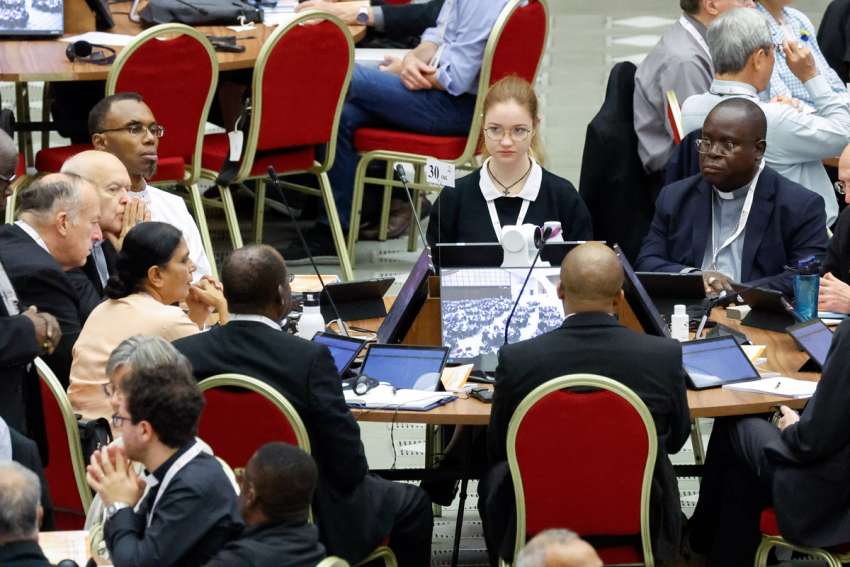Clifford, a professor of Systematic and Historical Theology at Saint Paul University in Ottawa, is one of the Canadian delegates chosen to be a voting member at the synod this fall. She is an ecclesiologist, which means she thinks about and studies the nature of the Church. She expressed her own amazement at being invited “to the table” and what an honour it is.
This synod is notable for its departure from previous formats: in this synod delegates sit in groups of 10-12 people at round tables, unlike previous synods where only bishops were present and sat in rows, theatre style. The only people present who were not bishops at those synods were experts presenting information. Bishops then voted on questions.
In the Synod on Synodality, no one person is governing the process. Everyone must listen to what each person around the table has to say. In small group discussions, members often address each other on a first name basis. During the plenary sessions, each member is introduced with full titles: Rev. Sister, Professor, Patriarch, Cardinal, etc. There are people from every continent in the world. Most exciting, there are “fraternal delegates” representing the World Christian Communions (e.g. Anglican Communion; World Communion of Reformed Churches; Baptist World Alliance; World Methodist Council) seated at the tables.
After listening to what each person has to say about the themes/questions under consideration, there is a time of silence to allow people to attend prayerfully to what moves them. This is not “a debate about ideas.” Rather it is “listening and discerning the lived experience of the churches.” For Clifford this has been a profound experience in which conversations between people who on the surface appear to be very different and with whom disagreement seems likely find themselves identifying important things that bind them together.
It is worthy of note that of the 364 delegates, 54 are women. While this may not seem like a lot, it is more than have ever participated in a synod before. With 35 tables called “Circoli Minori” (small circles), this means that there are potentially one or two women’s voices at each table. Besides the facilitator, each group has a designated “secretary.” Each group also elects a “relator” (reporter) who will work with the Secretary to prepare a written report and make an oral presentation of the group’s work. Dissent is permitted and recorded.
“The whole procedure of the synod is to create a dynamic where everyone has an equal voice,” said Clifford, which she noted is a significant change in the dynamics of Church meetings. “Big names don’t have any more access to the microphone or freedom to speak.”
One aspect of Clifford’s experience that is very relevant is her work in ecumenism. She feels that her experience of ecumenical dialogue has helped her enter into this kind of process of listening. Synodal and ecumenical conversations are both about “listening to hear what the other is really saying and how they understand themselves and to hear sometimes behind differences in language and emphases or differences in practice the same ecclesial values or the same basic ideas that are guiding people.”
Another “big rule” for dialogue is to enter the dialogue presuming the good faith of your dialogue partner and not looking to find fault with the other. As well, “every step of the way” it is important to look at yourself. The Decree on Ecumenism reminds us that we need to ask what needs to be reformed or renewed in our own Church so we can more faithfully reflect the Gospel. We, therefore, need to enter into conversations with “humility,” with “readiness to learn through these conversations and to undertake the kinds of renewal and reforms that are necessary in my own Church’s life and practice.”
She explained that during the meetings, delegates are “looking at a host of questions, very complex, heavy issues that all have to do with reform.” She never expected to see these questions being addressed in her lifetime. Indeed, she said, until very recently, many of the topics that are on the agenda today we could not have discussed openly without being accused of being disloyal or unorthodox. There wasn’t a space for a diversity of perspectives.
Clifford says that “Pope Francis has succeeded, through the synodal process, in creating a space for frank conversation where we can listen to one another, even though we may disagree, with respect.”
Clifford admits she is not sure where these conversations will take us as a Church and cautions it is going to take at least a generation to navigate this transition. There are no guarantees what the outcomes will be — but we know they will be momentous.


